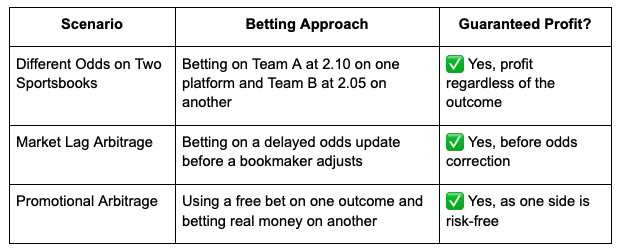We do not offer, support, or condone any illicit services mentioned in this glossary. We also do not sell any data to illegal entities. These terms are provided solely for educational and awareness purposes to help businesses understand and prevent fraud.
What is Arbitrage Betting?
Arbitrage betting, also known as “arbing,” “arbs,” or “sure bets,” is a gambling strategy in which an arber places bets on all possible outcomes of an event to secure a guaranteed profit. The arber identifies arbitrage opportunities where odds discrepancies exist across different sportsbooks.
While some bettors manually find these gaps, others use arbitrage bots to scan multiple betting platforms in real time. These bots automatically place small wagers to maximize efficiency and mask their activity to avoid detection.
How Does Arbitrage Gambling Work?
- Odds Discrepancies
- Line Variations: Different sportsbooks set odds independently, leading to price variations that bettors can exploit.
- Market Lag: Some bookmakers update odds slower than others, allowing arbers to capitalize on delays before adjustments are made.
- Promotional Offers & Bonuses: Some bettors manipulate free bets and bonuses to further reduce risk while maximizing returns.
- Multi-Platform Betting
- Placing Bets Across Bookmakers: Arbers place simultaneous bets on all possible outcomes across different platforms to guarantee profit.
- Arbitrage Betting Calculators: These tools help bettors calculate the exact stakes needed to ensure profitability.
- Automated Betting Bots
- Arbitrage Bots: Some bettors automate the process using bots that scan sportsbooks, detect favorable odds, and place multiple small wagers instantly.
- High-Frequency Betting: Automation allows for rapid bet execution, reducing the time required to capitalize on price differences.
Examples of Arbitrage in Sports Betting

Is Arbitrage Betting Legal?
The legality of arbitrage betting depends on regional gambling laws and bookmaker policies. While it is not illegal in most jurisdictions, sportsbooks often restrict or ban bettors who engage in this practice. Many operators prohibit arbitrage strategies in their terms and conditions, and accounts suspected of engaging in such activities may be limited or closed.
To minimize risks, some arbers disguise their activities by using multiple accounts, VPNs, or different payment methods. However, betting platforms continuously enhance their fraud detection systems to identify and restrict these strategies.
What Are the Other Types of Arbitrage Fraud?
1. Crypto Arbitrage Exploitation
- Traders take advantage of crypto price variations across different exchanges using automated crypto arbitrage bots.
- Fraudulent users may use manipulated trading volumes or exploit withdrawal delays to maximize profits.
2. E-Commerce Arbitrage
- Scammers exploit pricing errors or return policies to make risk-free purchases.
- Some individuals use digital arbitrage strategies to resell digital goods at inflated prices.
3. Payment Arbitrage
- Fraudsters manipulate currency exchange rate differences between financial platforms to profit from transactions.
- Some exploit chargeback policies, purchasing goods and later reversing transactions while retaining the product.
What Are the Impacts of Arbitrage Betting on Businesses?
Financial Losses
- Direct revenue loss due to manipulated odds, promotional abuse, and multi-accounting schemes.
- Increased chargeback risks from users exploiting refund loopholes.
Reputation Damage
- Loss of trust among genuine customers if bookmakers alter odds or restrict accounts due to widespread arbitrage abuse.
- Negative publicity from sportsbooks accused of unfairly banning bettors.
Operational Disruption
- Fraud detection teams must allocate resources to monitor suspicious betting patterns.
- Increased costs due to manual reviews and automated risk assessment tools.
Legal and Regulatory Consequences
- Some jurisdictions may impose regulatory fines if arbitrage activities disrupt fair betting markets.
- Bookmakers must comply with regional gambling laws and fraud prevention policies.
Loss of Competitive Advantage
- Betting platforms increase restrictions on payouts and promotional offers to counteract arbitrage exploitation.
- Customer dissatisfaction due to stricter security measures and account limitations.
How to Detect Sports Arbitrage?
Sports betting platforms must employ advanced fraud detection measures to identify arbitrage betting activities and maintain fair play.
1. Suspicious Betting Behavior
- High-Frequency Betting: Repeated bets on specific odds changes across multiple bookmakers signal possible arbitrage.
- Short-Lived Accounts: Users who withdraw funds immediately after a few high-value bets often exploit arbitrage opportunities and attempt to avoid detection.
2. Automated Risk Analysis
- AI-Powered Detection: Machine learning models analyze betting patterns, stake sizes, and frequency to flag structured betting strategies used for arbitrage.
- Arbitrage Bot Tracking: Monitoring IP addresses, device fingerprints, and automated betting activity helps detect and block arbitrage bots.
3. Behavioral Analysis & Real-Time Monitoring
- Adaptive AI Learning: Systems analyze betting habits over time, flagging sudden changes in behavior or unusually large wagers.
- Live Transaction Monitoring: Bets placed across multiple platforms are scanned in real-time, triggering alerts for suspicious activity and allowing immediate action.
4. Multi-Account & Bonus Abuse Detection
- Geolocation & Device Tracking: Identifies users attempting to bypass regional restrictions by using multiple accounts, VPNs, or different devices.
- IP Reputation Monitoring: Evaluates IP trustworthiness to block high-risk connections often associated with arbitrage betting bots.
- Pattern Recognition: Analyzes betting behavior to distinguish legitimate users from professional arbers.
5. AI-based Risk Control & Prevention
- Fraud Scoring & Account Restrictions: Automated risk assessments determine, based on activity patterns, whether accounts should be flagged, suspended, or restricted.
- Immediate Response to Arbitrage Activity: Platforms can take proactive measures such as limiting bet sizes, disabling promotional bonuses, or freezing suspicious accounts.
Read more on Detecting Arbitrage Sports Betting and how AI-powered fraud management solutions can help protect businesses.




.jpeg)








